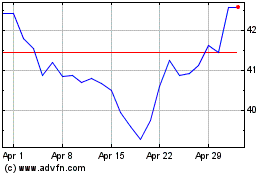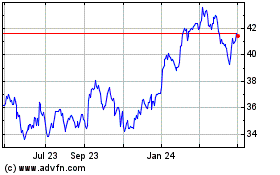GlaxoSmithKline Says Ovarian Cancer Study Validates Tesaro Acquisition
September 28 2019 - 3:59PM
Dow Jones News
By Carlo Martuscelli
GlaxoSmithKline PLC (GSK.LN) Saturday reported positive results
from a clinical trial of an ovarian cancer drug that a senior
figure in the company said justified the decision to buy cancer
specialist Tesaro for $4.16 billion.
Axel Hoos, head of oncology research at the FTSE 100-listed
drugmaker, said the results of the phase 3 Prima study could change
how women with ovarian cancer are treated going forward.
Data from the clinical trial showed that women with ovarian
cancer could benefit from being treated with Glaxo's drug Zejula,
regardless of whether they had specific genetic mutations.
The pharmaceutical giant picked up the drug as part of its
takeover of Tesaro in December. At the time, some financial
analysts criticized the company for overpaying for the acquisition,
and shares of Glaxo slumped after the deal was disclosed. But Mr.
Hoos told Dow Jones Newswires that these latest results show that
the decision to buy the company was justified. "[Zejula] was the
main reason for buying Tesaro," he said.
The study confirmed that Zejula worked particularly well in
patients with a mutated BRCA gene, as well in those with other
mutations that had a similar effect. Overall, they make up 50% of
the population of women with ovarian cancer.
Treatment with PARP inhibitors, the class of drug that Zejula
belongs to, has until recently been aimed at treating those with
these mutations--limiting their uptake and requiring genetic
testing. However, the trial showed that Zejula also had a
clinically meaningful positive effect on the other half of women
that don't test positive for those biological markers, though not
to as great of an extent.
"This is a compound that provides benefit across the spectrum,"
said Mr. Hoos.
Data from the trial showed Zejula reduced the risk of the
disease progressing in women with advanced ovarian cancer by 38%
when compared with a placebo
He said that the drug could eventually become a standard
treatment, administered along with surgery or chemotherapy, and
without the inconvenience of having to administer special genetic
tests.
Nearly 300,000 women are diagnosed with ovarian cancer every
year, and it is the eight most common cancer for women around the
world.
(END) Dow Jones Newswires
September 28, 2019 15:44 ET (19:44 GMT)
Copyright (c) 2019 Dow Jones & Company, Inc.
GSK (NYSE:GSK)
Historical Stock Chart
From Mar 2024 to Apr 2024

GSK (NYSE:GSK)
Historical Stock Chart
From Apr 2023 to Apr 2024
